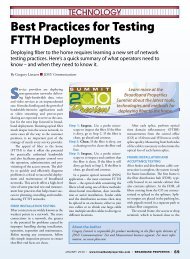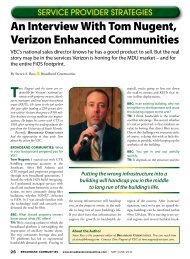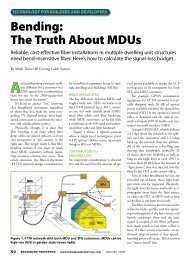2010 Buyers Guide - Broadband Properties
2010 Buyers Guide - Broadband Properties
2010 Buyers Guide - Broadband Properties
You also want an ePaper? Increase the reach of your titles
YUMPU automatically turns print PDFs into web optimized ePapers that Google loves.
World Bank: <strong>Broadband</strong>’s Effect<br />
On Worldwide Economic Growth<br />
Excerpted from “Information and Communications for Development<br />
2009,” by Mohsen Khalil, Philippe Dongier and Christine<br />
Zhen-Wei Qiang, The World Bank Group, available at http://www.<br />
worldbank.org/ic4d.<br />
<strong>Broadband</strong> has considerable economic impact at all levels<br />
of individuals, firms and communities. Individuals increasingly<br />
use broadband to acquire knowledge and skills to increase<br />
their employment opportunities. Where broadband has been<br />
introduced in rural areas of developing countries, villagers<br />
and farmers have gained better access to crop market prices,<br />
training and job opportunities. In developed countries and<br />
urban areas in developing countries, an increasing number<br />
of individuals build up social networks through broadbandenabled,<br />
peer-to-peer Web-based groups that facilitate economic<br />
integration and drive development. Blogs (Web logs,<br />
or online diaries), wikis (Web sites where users can contribute<br />
and edit content), video sharing sites and the like allow new,<br />
decentralized and dynamic approaches to capturing and disseminating<br />
information that allows individuals to become<br />
better prepared for the knowledge economy.<br />
Access to broadband supports the growth of firms by<br />
lowering costs and raising productivity. Realizing these performance<br />
improvements, however, depends on firms’ ability<br />
to integrate their technological, business and organizational<br />
strategies. When fully absorbed, broadband drives intense,<br />
productive uses of online applications and services, making it<br />
possible to improve processes, introduce new business models,<br />
drive innovation and extend business links.<br />
A study involving business and technology decision makers<br />
in 1,200 companies in six Latin American countries<br />
– Argentina, Brazil, Chile, Colombia, Costa<br />
Rica and Mexico – showed that broadband deployment<br />
was associated with considerable improvements<br />
in business organization, including<br />
speed and timing of business and process reengineering,<br />
process automation, data processing<br />
and diffusion of information within organizations.<br />
Firms in the media, export and other<br />
information-intensive sectors have benefited<br />
most from integrating broadband into their<br />
business processes. Clarke and Wallsten (2006),<br />
in a study of 27 developed and 66 developing<br />
countries, found that a 1-percentage-point increase<br />
in the number of Internet users is correlated<br />
with a boost in exports of 4.3 percentage<br />
points. Increases of 25 percent or more in<br />
the efficiency of claims processed per day have<br />
been documented by U.S. insurance companies<br />
that have adopted wireless broadband (Sprint<br />
2006). Other industries that have benefited significantly<br />
include consulting, accounting, marketing,<br />
real estate, tourism and advertising.<br />
Local communities around the world have<br />
realized considerable economic gains and<br />
new opportunities from broadband services. Studies from<br />
Canada, the United Kingdom and the United States find that<br />
broadband connectivity has a positive economic impact on<br />
job creation, community retention, retail sales and tax revenues.<br />
In rural areas of developing countries, communities<br />
have recently begun to launch broadband services and applications<br />
that give local populations access to new markets and<br />
services. Facilitating information exchange and value creation<br />
between buyers and sellers of agricultural products, which<br />
has improved income and livelihoods in rural areas, is a prime<br />
example of this. Previously, such opportunities were available<br />
only in the largest or wealthiest localities.<br />
According to a recent World Bank econometric analysis of<br />
120 countries, for every 10-percentage-point increase in the<br />
penetration of broadband services, there is an increase in economic<br />
growth of 1.3 percentage points. This growth effect of<br />
broadband is significant and stronger in developing countries<br />
than in developed economies, and it is higher than that of<br />
telephony and Internet. The impact can be even more robust<br />
once the penetration reaches a critical mass.<br />
Because broadband networks have the potential to contribute<br />
so much to economic development, they should be<br />
widely available at affordable prices and should become an<br />
integral part of national development strategies. Currently,<br />
though, few people in developing economies have access to<br />
broadband networks. In 2007, an average of less than 5 percent<br />
of the population of low-income economies was connected<br />
to broadband networks, and that was mostly in urban<br />
centers. In this light, developing countries are missing a great<br />
development opportunity.<br />
Growth Effects of Information<br />
and Communications Technologies<br />
The y-axis represents the percentage-point increase in economic growth per 10-percentage-point<br />
increase in telecommunications penetration.<br />
70 | BROADBAND PROPERTIES | www.broadbandproperties.com | November/December 2009

















